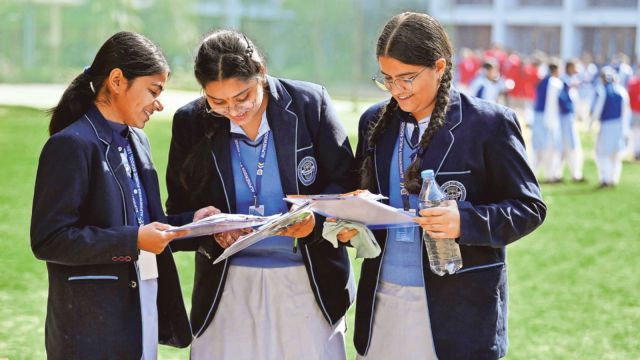Longer exam, more questions likely for CBSE advanced science, social science papers
The advanced level will “delve deeper into concepts and foster critical thinking”, the minutes of the CBSE’s governing body meeting held in December last year noted, which was made public recently.
 Students at an examination centre in New Delhi. (File)
Students at an examination centre in New Delhi. (File)Exams for a longer duration along with additional questions for students who choose the advanced level are among proposals that the Central Board of Secondary Education (CBSE) is considering as part of its plan to offer science and social science at two levels — standard and advanced — in class 9 and 10.
Already, the board offers math exams at two levels in Class 10 — standard and basic.
The advanced level will “delve deeper into concepts and foster critical thinking”, the minutes of the CBSE’s governing body meeting held in December last year noted, which was made public recently.
At the meeting, the governing body, the highest decision-making authority, approved the decision to offer science and social science at two levels in class 9 and 10. As per the minutes, while the standard level exams may be for a “lesser duration”, the advanced level exams might be longer, “allowing for a greater depth of content in the latter”. Both levels of the exams will be conducted on the same day and at the same exam centre.
Those opting for the advanced level will get a separate supplementary question paper annexure, containing additional questions that “require advanced understanding and higher order skills”, the minutes said. On the syllabus, however, the CBSE has proposed that a common core curriculum be retained, and some topics requiring “in-depth study” at the advanced level be identified by subject experts.
Last week, both CBSE and National Council of Educational Research and Training (NCERT) officials said that the new science, social science, and maths textbooks for class 9 will have additional content for the advanced level, and these books will be available in the 2026-27 academic session. With two levels of exams in maths, the minutes noted that this limits the “advantages that such flexibility could bring to other key subjects like science and social science.”
“Introducing two levels for these subjects would allow students to select the level of complexity that best aligns with their interests and future pathways, thereby promoting meaningful engagement and reducing academic stress,” it stated.
Students inclined towards engineering, medicine or other STEM careers could opt for an advanced level in science, “which delves deeper into concepts and fosters critical thinking”, the minutes noted, adding that pursuing non-STEM fields could choose the standard level, “emphasizing core understanding rather than in-depth theoretical analysis”.
As for social science, the advanced level could “facilitate deeper exploration of historical events, geographical patterns and economic systems, fostering analytical and critical thinking skills”, it noted. The standard level is meant to help students understand the “broader significance of concepts in real-world contexts.”
CBSE is also proposing to “rename and reorganise” the maths paper on the same lines as science and social science — standard and advanced level in class 9 and 10. Under the current system for maths in class 10, the exam papers for standard and basic levels are based on the same syllabus.
To implement the plan for these subjects at two levels, CBSE is considering “comprehensive training for teachers on differentiated instruction and assessment practices to ensure they are well prepared to teach and assess students at varying levels.”
In November, the CBSE’s curriculum committee had considered and approved the proposal for these subjects at two levels. Going by the committee meeting’s minutes, arguments that the members cited in favour of the proposal include alignment with the National Education Policy (NEP) 2020, providing “adequate challenge for students with advanced aptitude”, reducing “reliance on coaching centres by strengthening the STEM curriculum from class 9,” and preparing students for higher education via early engagement with the “required level of complexity.”







